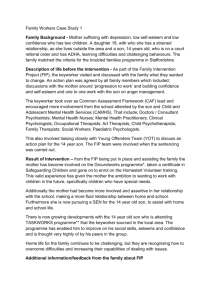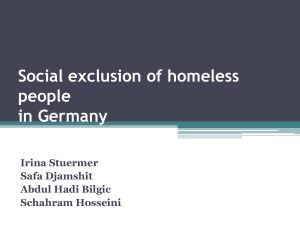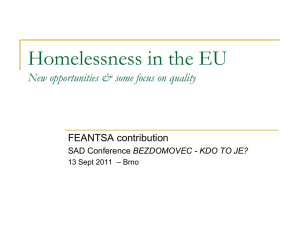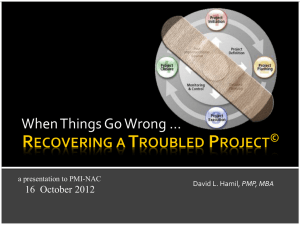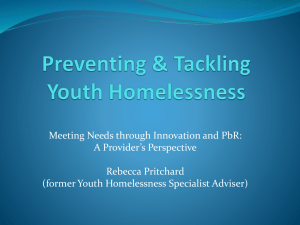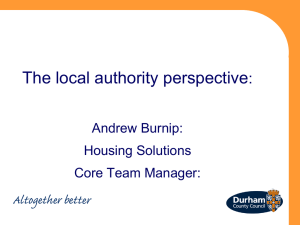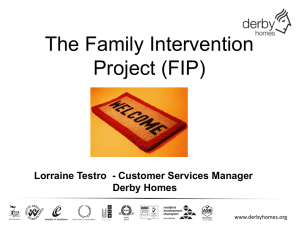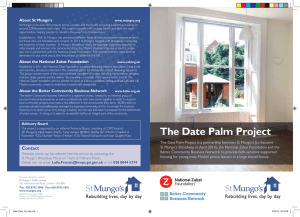presentations from the event
advertisement
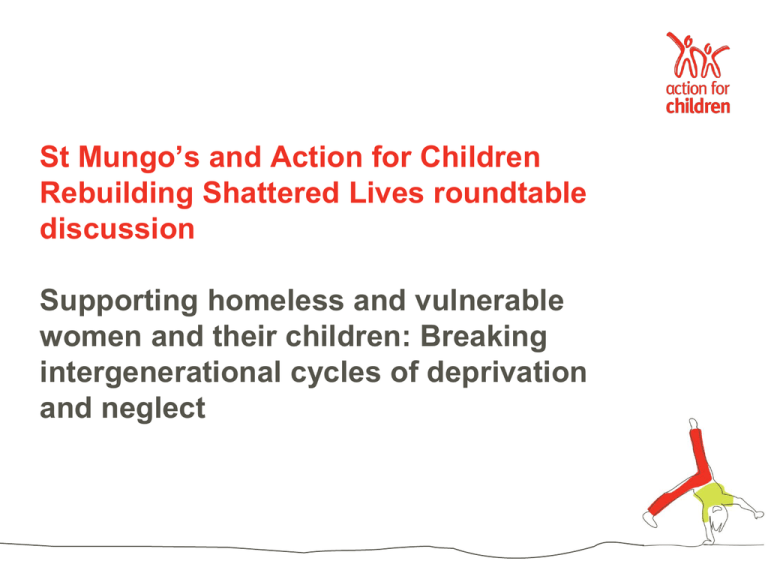
St Mungo’s and Action for Children Rebuilding Shattered Lives roundtable discussion Supporting homeless and vulnerable women and their children: Breaking intergenerational cycles of deprivation and neglect The Family Needs of Homeless Women with Complex Needs Alexia Murphy St Mungo’s St Mungo’s – Our Vision Everyone should have: • A decent place to live • Something meaningful to do • Satisfying relationships with other people • The good health to enjoy them Who are the Women we work with in St Mungo’s? • • • • Demographics Needs and ability Housing and Resettlement Women in contact with the CJS Case Study – Sarah • Childhood experience of severe parental violence • Contact with the care system • Substance Use • 4 children • Housing History • A life lived subject to assault Women’s pathway into homelessness • • • • History of abuse and violence Traumatic loss of children/family Substance use / mental health Often not characterised by contact with homelessness/statutory services • Childhood characterised by unstable housing and/or childhood /adolescent abuse Better Deal for Women Peer Research Project - why women achieving poorer outcomes than men and what can be done Conclusions • Complexity of needs • Accommodation recommendations • Staff understanding and training • Children and Families as the key recovery goal Missing Families • Addressing emotional and relationship needs • The myth of the ‘single homeless person’ • Approaching family work • Developing relationships with children’s social services What works? • • • • Women’s Outside-In group Lifeworks Psychotherapy Enabling child contact Chrysalis – Psychologically informed environment What works? Key considerations: Stigma / barriers to services Domestic Violence Pregnancy Prostitution Rebuilding Shattered Lives – a call for solutions • 18 month Campaign • Panel of Experts • 9 key themes Themes and Experts • • • • • • • • • Housing and Homelessness Substance Use Domestic Abuse Families and children Childhood Trauma Employment and Skills Women involved in the CJS Mental Health and Wellbeing Involvement in Prostitution alexia.murphy@mungos.org Troubled Families Joe Tuke Director Troubled Families, DCLG The programme The families Family Intervention Challenge for System Reform The programme • PM commitment to ‘turn around lives’ of 120k troubled families by 2015 • Schooling, youth crime/ASB, work; high cost • Primarily PbR. Up to £4k per family • Programme started April 2012; as at Dec 2012 65k identified and 23k being worked with • Not an education programme, not an employment programme, not a crime programme .... a family programme turning around each of 120k troubled families. The families Evaluation will provide richer picture but we know: • have complex family structures – nearly 1 in 5 FIP families have more than five children • often have inter-generational problems that have proved intractable • have a comprehensive range of needs/problems – a quarter of mums have a long-standing illness, in 1/3 of FIP families there is DV, 1/2 FIP families include children who are truanting, excluded or behaving badly at school. • have high impact on community – an estimated 1 in 5 young offenders come from troubled families • attract multitude of uncoordinated services –up to 20 different agencies involved with one family Family Intervention Pioneered by Action for Children – Dundee Homeless Families Project • A dedicated worker dedicated to the family • Who looks at what’s really happening for the family as a whole • And gives practical hands-on support • With an assertive and challenging approach • Backed by an agreed plan and common purpose among the relevant services. System Reform Challenge Mum plus 4 children … • Eldest in LA care, placed back in family • Next on Child Protection Plan • Next is Child in Need • Next has got Team around Child Not integrated, not whole family, not getting outcomes
